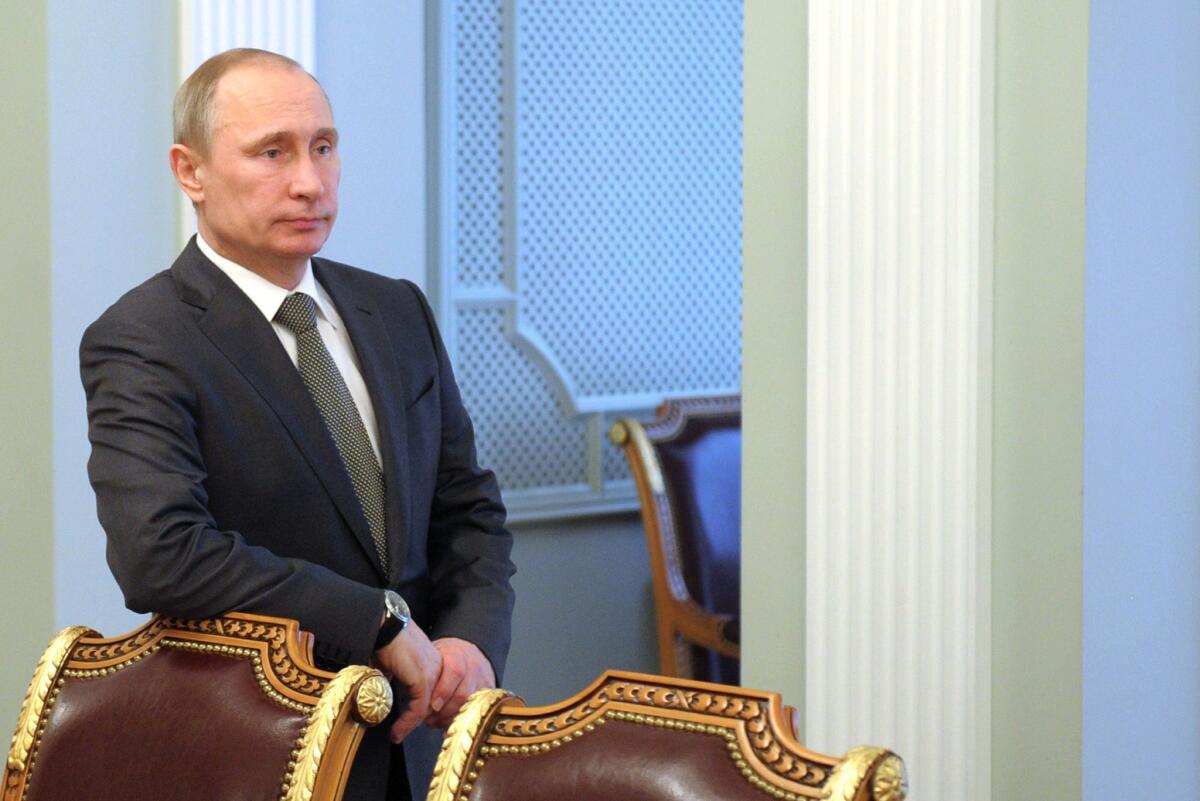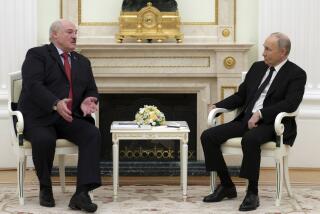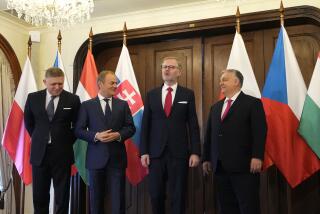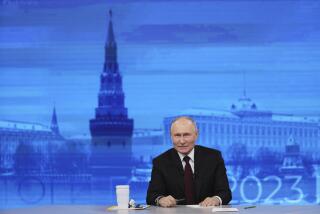Kremlin aggravated Ukraine crisis but won’t intervene, analysts say

MOSCOW -- Russian President Vladimir Putin’s demand that Ukraine choose between closer ties to the European Union or its traditional alliance with Moscow intensified the deadly crisis in Kiev threatening to escalate into civil war, analysts say.
Kremlin leaders only a few years ago spoke of a trilateral approach to Ukraine’s economic development, with Moscow providing the financial lifelines its former Soviet subject needed to keep the wheels of its integrated industries turning. Western Europe, they said, would provide a model for independent Ukraine’s strengthening of the rule of law and civil rights, including protection of the 7.5 million Russians living in Ukraine.
But Putin’s push for a Moscow-controlled Eurasian Union of former Soviet states at the expense of the earlier vision of a common economic space spanning from Lisbon to Vladivostok presented Kiev with an either-or choice. Ukrainian officials faced infuriating the Western-leaning half of the country or eastern and southern Ukrainians dependent on Russia’s joint production and trade.
PHOTOS: Deadly clashes in Ukraine
As the confrontation over Ukraine’s future spun out of control this week, fears emerged that those unhappy with Putin’s rule and repression might take the same aggressive path of open revolt against the Kremlin and unleash a bloodbath in Russia. And some wondered in nervous whispers whether Putin was intent enough on ensuring Kiev’s allegiance that he might send in troops to quell the unrest, as Soviet forces did to crush the Prague Spring reforms in Czechoslovakia in 1968.
While analysts consider Putin to have made a dangerous mistake in bullying Ukrainian President Viktor Yanukovich into rejecting an EU association deal in November, they see no chance of the Kremlin riding in to rescue the embattled Ukrainian leader for multiple reasons, not least of which being that the two leaders despise each other.
There is also little chance, analysts say, that Russians would engage in the kind of chaos seen in Kiev this week given that they have much more to lose in vastly improved living conditions achieved during the last 15 years.
Putin may lack sterling democratic credentials but “he’s no dictator,” former Prime Minister Mikhail Kasyanov said in an interview.
“This wasn’t a sudden mistake [to pressure Yanukovich to drop the EU deal], it was part of Mr. Putin’s overall policy that these former republics are not mature countries, that they need an older brother to direct them,” said Kasyanov, government chief from 2000 to 2004 who broke with Putin after his first presidential term over his refusal to modernize the economy and free major industries from state control. “That’s the mentality of the Kremlin, and it aggravated the situation in Ukraine.”
The risk to Russia’s traditional economic ties with Ukraine because of the EU association agreement was “hugely exaggerated” by the Kremlin as part of its attempt to portray Russia as being victimized by Europeans and the United States, said Igor Yurgens, head of Moscow’s Institute for Contemporary Development and a leading economic strategist throughout the country’s political tumult over the last quarter century.
It was going to be many years before Ukraine would be seriously considered for membership in the 28-nation EU, Yurgens said, and the boost in trade and cooperation that supporters of the accord expected were also going to be a long time coming.
Ukraine’s need was immediate, forcing Yanukovich to bow to Kremlin pressure to abandon the EU association deal that was to have been signed at a late-November summit in Lithuania.
“The $15 billion [from Russia in an agreement reached after Yanukovich rejected the EU accord] was critical for Ukraine and it wasn’t going to be forthcoming from the West,” Yurgens said, noting the Hobson’s choice the Kiev leadership faced when the Kremlin delivered its us-or-them ultimatum.
Russia has taken a carrot-and-stick approach toward Ukraine since the EU negotiations began three years ago. Moscow imposed trade tariffs on Ukrainian steel and chocolate, which cost Ukraine $6.5 billion last year in a foretaste of the consequences Kiev would face if it jilted Putin in favor of the EU, former Ukrainian Prime Minister Mykola Azarov told his countrymen in explaining the decision to scrap the EU association.
The Kremlin offered Ukraine the $15 billion in loans and energy subsidies to prevent it from falling into bankruptcy, a gesture welcomed by the pro-Russian half of the population but viewed by the opposition as Moscow buying influence over their country.
Putin seemed to signal the limit to his willingness to keep a maleable figure in the Ukrainian presidency when, at Yanukovich’s request for a Russian emissary to join tense all-night negotiations with three visiting EU foreign ministers, the Kremlin dispatched human rights ombudsman and former opposition figure Vladimir Lukin. If Yanukovich expected a sympathetic Kremlin observer, he was sadly mistaken, Yurgens said.
A deal brokered by the visiting troika and signed by Yanukovich and his political opposition on Friday called for early presidential elections this year instead of next. Deputies of the Supreme Rada also voted to strip the powers of the presidency – a key opposition demand that had been blocked by Yanukovich’s Party of Regions majority until several defections in protest of the government’s bloody crackdown on demonstrators this week.
“Yanukovich is finished,” Yurgens said of his capitulation on early elections and perceived culpability for the widely condemned use of force.
The brutality of the Kiev showdown is likely to chasten the Russian political opposition, rather than inspire it to wage a similarly aggressive confrontation.
“There is a clear preference for the status quo, even with the loss of many civil rights,” said Masha Lipman, editor of the Pro and Contra online political journal and an analyst with the Moscow Carnegie Center think tank.
“People say they want change, but change is associated with turmoil and people fear that,” especially considering recent events in Kiev, Lipman said. “Russians remember the 1990s, after the Soviet collapse when there was this wild period and a complete loss of security, and they fear that. Russians know they are materially better off than Ukraine and they will not put that at risk for more rights.”
Twitter: @cjwilliamslat
More to Read
Start your day right
Sign up for Essential California for news, features and recommendations from the L.A. Times and beyond in your inbox six days a week.
You may occasionally receive promotional content from the Los Angeles Times.







